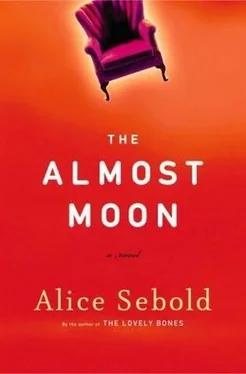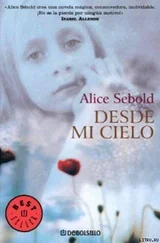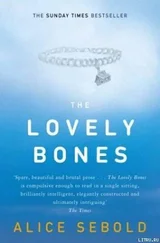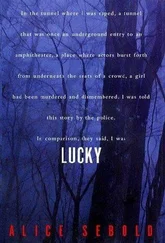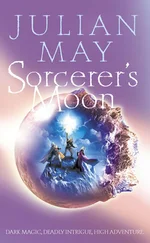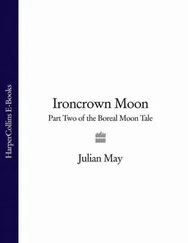When I was three years old, I had come into the kitchen and found my mother sitting on the floor, with her legs jutting out in front of her. I could see her underwear, which I had never seen before. She was staring at a white spill of flour at her feet.
“Mom made a boo-boo,” I said.
She stood up and grabbed the five-pound sack of flour from the counter, hugging it to her chest. She scooped her hand into it and let the contents fall from her fingers like snow.
I shrieked in delight and ran to her. She responded by moving away just as I reached out for her. She threw more flour from the sack, this time in wide arcs across the kitchen. I chased her in spinning circles, around and around, shrieking louder and gulping back my own laughter.
The chase went on until I stumbled and fell. I looked up at her for a moment. She stood near my high chair, laughing. I noticed the flour on her forehead and chin, and how it coated the invisible hairs on her forearms. I wanted her to come to me to pick me up, and so I wailed at the top of my lungs.
My purse sat upright on the dining room table. I tucked the Ziploc bag, with its silver prize, inside the center compartment and, as if I might forget something, looked all around me, doing a 360-degree turn. I jumped when I saw Mr. Fletcher in a lit-up window, staring back at me, until I realized I had not turned on a light in the dining room and that he was staring not at me but at a computer terminal, which, as he searched the Internet or played the same Byzantine games that Emily’s husband liked, lit his face in flashes of blue and green.
When I reached my car and looked back up the brick path to the front door, the light dusting of white powder on my chest and legs-the sugar from the pecan meringues, the flour from the Mexican wedding wafers-was the only thing that marked me as having been in my mother’s basement.
I wanted to weep, but instead I thought of where I could go. I had to relax. No one knew except Jake. What felt like other people’s knowing-the call to Avery, the questioning from Mrs. Leverton, the whispering of my name by Mrs. Castle-wasn’t. And no one would go into the house without me there.
I sat in my ancient Saab with the windows rolled up and placed my purse on the passenger seat, resisting the impulse to strap it in like a child. I put the key in the ignition and started the car. Slowly I pulled away, hunching over the steering wheel as if the streets were dense with fog.
Mrs. Leverton’s house was dark except for the timer lights her son had installed. The clock on the dashboard read 8:17. Time for old women to be tucked in. But apparently not old men. As I drove by Mr. Forrest’s house, I could see him reading in his front room. All his lights were on. He had never believed in blinds. At least in the old days, he had always had dogs. There he is, I thought to myself, an old man vulnerable to bullies and thieves.
I was sixteen that day in Mr. Forrest’s house, when I’d first seen color plates of women in various states of undress.
“They call them muses, Helen,” he had said as he watched me turn the pages of an outsize book called simply The Female Nude. “They are women who inspire great things.” I had thought of the pictures that stood throughout our house. Pictures of my mother in outmoded support garments or diaphanous peekaboo gowns, smiling winsomely into the camera.
The thirty-minute drive between my mother’s house and my own had always been an excuse for talk. Some people talk to themselves in front of their mirrors at home, psyching themselves up to ask for a raise or undertake a self-improvement project. I had always talked to myself most inside the car on the back roads that led from Phoenixville to my suburban faux colonial in Frazer. The halfway point, mentally, if not physically, was Pickering Creek and the small one-lane bridge that crossed it.
The night I killed my mother, I sang to myself in a low hum in an effort to create a sort of white noise in between me and what I had done. Every so often I would say, “You’re okay, you’re okay, you’re okay,” as I pressed more tightly on the wheel to feel the squeeze of blood that pulsed at the ends of my fingertips.
At Pickering, I waited on the Phoenixville side for a beaten-up Toyota to pass by, and as I crept over the bridge, my car lurched up briefly on the patched road. My headlights seemed to catch something moving in the limestone ruins on the other side. It looked like a man, lit up and dancing over the dark rock, and I shivered in my clothes.
On the other side of Pickering, the trees were thinner and denser, and struggled during the day to get any sun through the crowded canopy above. A decade ago, excavation crews became a common sight here, and I would drive by to see one hundred birch saplings having been mown to the ground. I hated to say that Natalie’s house, which was halfway between my mother’s and my own, was one of the McMansions that had been carved out of these woods. It shouted up out of the forest, with mock storybook turrets and a front door fifteen feet tall.
Natalie and the now thirty-year-old Hamish had lived inside this gingerbread palace for eight years, ever since Natalie successfully sued the manufacturer that supplied the tires to her husband’s truck. He had been idling on Pickering Bridge in a stare-down with another car and had revved his engine. His front tire exploded, breaking the axle and ejecting him through the windshield, and he hit his head on the old fieldstone bridge that had lain in ruins for more than a century. He died instantly.
Through the scrim of young white-barked trees that had grown back since the developers came and went, I saw Hamish lying in the driveway, one of his many cars ratcheted up, with a bright cage light hanging from the front fender. I slowed down and brought my car to a halt. Without a thought for what I would say when I saw her, I swung my car off the empty road and drove up the length of Natalie’s driveway. I seemed to be doing almost explicitly what Jake had told me not to, but I couldn’t stop myself.
As my headlights mingled with the glow from the broken car, Hamish rolled himself out on his mechanic’s dolly and motioned for me to switch them off.
I turned off the ignition and got out. My first steps were wobbly on the gravel drive.
Hamish ducked toward me, flipping his hair to the side of his face.
“Mom’s out,” he said.
I had never stopped thinking of Hamish as the boy who played with Emily in the sandbox in the community park at the end of my street. “Hamish is going nowhere-fast,” Natalie said in the years after Hamish Sr.’s death. She seemed happy about it. As if she’d lost one Hamish, but this Hamish was sure to stick around.
“Out where?”
“She’s on a date,” Hamish said, and smiled. His teeth were as white as stadium lights. Natalie had told me that he bleached them every six months.
I didn’t know which was stranger, that I found myself in the driveway of my oldest friend after killing my mother or that Natalie had gone on a date without telling me.
“I just remembered I wasn’t supposed to say anything,” he said. “Don’t tell her, Helen. I don’t want to get her mad at me.”
“No worries,” I said-two ridiculous words that I had picked up from an Australian-born administrator at Westmore. It applied to everything. “The kiln has exploded.” “No worries.” “I’m canceling Thursday’s Life Drawing class.” “No worries.” “I’ve murdered my mother, and she’s rotting as we speak.”
“Seriously, Hell,” Hamish said. He had picked up the nickname habit at Valley Forge Military Academy, where Hamish Sr. had forced him to go to develop moral fiber.
“I’m not feeling too well, Hamish,” I said. “I’m going to sit down.”
Читать дальше
